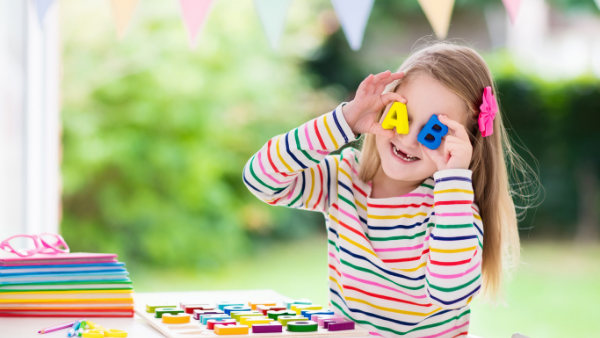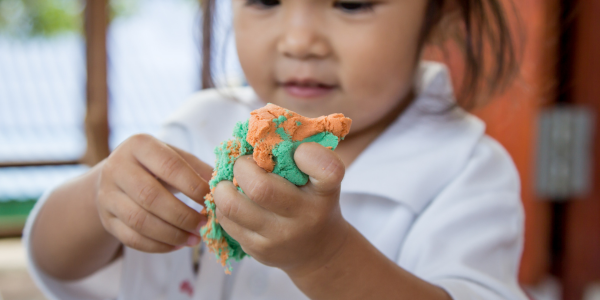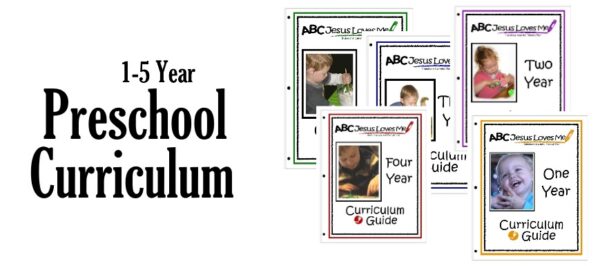Jenna asked a great question on the ABCJesusLovesMe Facebook Group…
What are the basic skills needed to learn? Are they letter recognition, sounds, etc?
Preschool learning apps and TV programs lead us to believe that letters should be the focus of the child’s preschool years. But there is so much more to foundational learning than letters! Basic skills like fine motor, social interaction, pencil grip, creativity, taking turns, visual perception, pragmatics…just to name a few…are vital for a child’s success. Let’s break it down.

Strong Foundation
Think of learning like climbing steps. We all begin on the first stair. Then we take the next step. And another. And another. Successfully climbing stairs requires stability of each step. If the step we’re standing on is weak or unstable, we won’t be able to push off and climb higher.
I created the ABCJesusLovesMe Curriculum to provide those stable steps necessary for parents and teachers to provide the stairway of learning. Based on the child’s age and development, the Lesson Plans and activities incorporate academic, development, and Bible learning so that each step in the preschool journey is strong, providing the necessary foundation to push off onto the next level.
Problems arise when parents and teachers skip or gloss over levels, believing the levels aren’t important or simply allowing distraction to interrupt consistent teaching. Or, even worse, the adult thinks that electronics will provide the necessary learning. Hint: Apps and TV do not provide child with a solid educational foundation.

Preschool Learning Levels
Here are a few examples of preschool learning levels and how they build upon one another.
~ Shapes to Letters and Numbers
A child must differentiate the various shapes before he can understand letters and numbers, because letters and numbers are made of shapes. If a child can’t differentiate between a triangle and a circle, the child won’t be able to tell the difference between an “A” and a “C.” Sadly, adults push kids to recognize letters and numbers because they believe that early reading equals academic success. All children learn when the proper foundation has been built and cognitive skills are in place. This cannot be forced.
~ Rhymes and Songs
Creating and hearing rhyme is a requirement to reading. This is why poems, Nursery Rhymes, and fingerplays are included in each of the curricula. But pre-reading isn’t the only learning that they provide. According to Tiny Happy People, rhyming poems and songs:
- Introduce kids to new words
- Teach basic math concepts
- Build emotional awareness
- Develop memory and listening skills in young babies
- Lullabies can reduce a baby’s heart rate and how often they blink
- Boost fine and gross motor skills
- Rhymes with gestures build socio-cognitive abilities
- Teach toddlers where words begin and end in sentences
- Help children recognize the sounds in words
- Help preschoolers learn to read
- Strengthen the bond between the adult and child

~ Fine Motor
A child must be able to pick up Cheerios or coins before she can turn pages in a book. A child must be able to manipulate play dough or clay before he can hold a pencil to form letters and numbers. In other words, play dough isn’t just a fun gift. Using it can be an important part of the child’s development. As the child manipulates the dough, muscles are learning to work in separate ways while building strength. Years ago kids used mud for this sensory play, but so few kiddos have the opportunity to play in the dirt and mud anymore. This is why each of the ABCJesusLovesMe Curricula include weekly fine motor activities.
~ Visual Perception
A child’s brain and eyes must communicate correctly for the child to be able to read and write. We call this communication visual perception. A few months ago, I shared about the visual perception delays that my teen daughter was dealing with and the issues it caused in reading words and music. For several reasons, it wasn’t caught early on. I don’t want any child to go through what she did. Thus, the 4 and 5 Year Curricula and the Visual Perception Curriculum provide visual perception activities – much like the ones she did in therapy.

What are the Basic Learning Skills?
The simple answer is, the basic skill needed to learn is the skill that precedes that skill. This is why I continually say, “Do. Not. Skip.” I ask parents and teachers to trust the process of learning with consistency and repetition. The ABCJesusLovesMe Curriculum is proven. All you have to do is follow it and have fun.
I love ABCJesusLovesMe. It’s so flexible and sooooo easy to do! You really won’t feel like you’re “teaching.” It feels like you’re spending meaningful, quality time with your child. I held off for two years with my first child because I thought it would be impossible to do while I worked full time, but now using the 2 Year Curriculum with my second child, I wish I had used it with my first son. Go for it! You won’t regret it! –Evamarie on Facebook


After reading this, a light 💡 bulb went off in my head. You’re so right about the foundation, you can’t learn numbers or letters without knowing shapes 🔴 because they are all shapes. You have to be able to recognize each letter.
I want this curriculum.
Vendramini – I am so glad that you found this blog post helpful. You can learn more about the ABCJesusLovesMe Curriculum at ABCJesusLovesMe.com. Please let me know what questions you have! –heidi